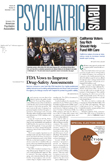Amid ongoing concerns that it has failed to protect the public health, the U.S. Food and Drug Administration (FDA) announced last month that it would take five steps toward strengthening the agency's drug safety programs. The move comes in the wake of ongoing Congressional inquiries into how the agency responded to and managed early concerns about the safety of antidepressants and the anti-inflammatory COX-2 inhibitor, rofecoxib (Vioxx).
Lester M. Crawford, D.V.M., Ph.D., acting FDA commissioner, said“ modern drugs provide unmistakable and significant health benefits, but experience has shown that the full magnitude of some potential risks have not always emerged during the mandatory clinical trials conducted before approval.”
The recent examples of pediatric use of antidepressants and risk of heart attack or stroke associated with Vioxx, he noted in a prepared statement posted on the FDA's Web site, are the latest examples of “serious adverse events that are identified after approval, either in postmarketing clinical trials or through spontaneous reporting of adverse events.”
The FDA, Crawford continued, has a drug safety program “designed to assess adverse events identified after approval.” But, he cautioned,“ detecting, assessing, managing, and communicating the risks and benefits of prescription and over-the-counter drugs is a highly complex and demanding task. The FDA is determined to meet this challenge.”
Crawford outlined a five-step plan to be undertaken by the FDA's Center for Drug Evaluation and Research (CDER), beginning with an FDA-sponsored review by experts from the National Academy of Sciences' Institute of Medicine (IOM). An IOM committee will study the effectiveness of the U.S. drug safety system, with an emphasis on the postmarket phase, and will assess what additional steps could be taken to learn more about the side effects of drugs as used by consumers. The committee will also recommend measures aimed at enhancing the confidence of Americans in the safety and effectiveness of available drugs. The timeframe for these activities has not yet been determined.
Second, CDER will formalize a “program to provide an improved process ensuring that the opinions of scientific reviewers are incorporated into its decision-making process.” This step comes in response to stern criticism from Congressional inquiries that uncovered at least two instances of FDA medical reviewers who identified early warning signs of possible safety concerns, only to be allegedly silenced by their FDA superiors.
On the antidepressant issue, medical reviewer Andrew Mosholder, M.D., identified his concerns in a memo to superiors regarding his suspicion of an increased incidence of suicidal thoughts and behaviors in children and adolescents who had depression and were taking SSRI antidepressants. Mosholder's concerns and subsequent recommendations for further study and potential warnings were allegedly squelched by his superiors, and his report was yanked at the last minute from the agenda of the February meeting of the Psychopharmacologic Drugs Advisory Committee.
Similarly, early concerns raised by another FDA medical reviewer regarding the cardiovascular safety of rofecoxib were allegedly ignored for years, and the reviewer was disciplined and reassigned.
Crawford's third point in the plan is to step up the search for a director of the Office of Drug Safety, a position that has been vacant for close to a year. A national search will be conducted for a candidate “who is a nationally recognized drug safety expert with knowledge of the basic science of drug development and surveillance,” Crawford said, “and has a strong commitment to the protection of public health.”
Fourth, CDER will conduct over the next year a series of workshops and advisory committee meetings to discuss “complex drug safety and risk management issues.” Topics may include emerging concern for products that are either already on the market or that are investigational. Input will be sought on how to balance the risks of a particular drug with its demonstrated benefits. This series of “risk management consultations” will likely involve FDA experts, scientists from other government agencies, academia, the pharmaceutical industry, and the health care community.
Lastly, Crawford announced, “By the end of this year, the FDA intends to publish final versions of three guidances that have been developed by our agency to help pharmaceutical firms manage risks involving drugs and biological products.”
These documents, he noted, were issued as draft guidances in May (
see box) and are designed to assist pharmaceutical companies in identifying and assessing potential safety risks before and after a drug reaches the market and “promote the use of good pharmacovigilance practices and pharmacoepidemiologic assessment.”
Crawford said, “I am satisfied that these additional activities will strengthen the agency's program to greater ensure the safety of medical products that are making a major contribution to the health and quality of life of millions of Americans.”
Crawford's statement is posted online at<www.fda.gov/bbs/topics/news/2004/NEW01131.html>. More information on the FDA's pilot program for resolving differing professional opinions regarding drug/product safety is posted online at<www.fda.gov/cder/mapp/4151.2.pdf>.▪
